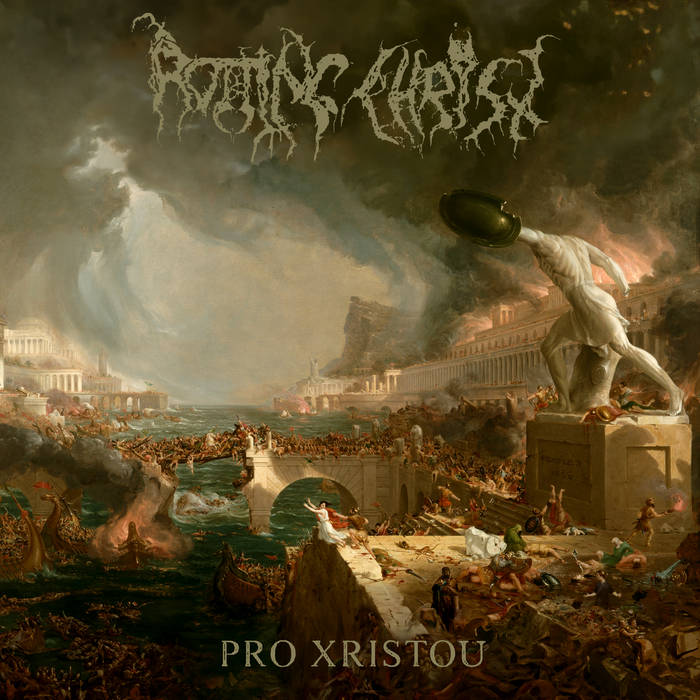Rotting Christ: Pro Xristou
Out 24th May on Season of Mist
Mapping the career of artists that have been consistently active for as long as Rotting Christ presents us with an interesting demonstration of how historical progress ground to halt by the mid-2000s. Their career dates back to the very beginnings of black metal as it developed into a self-conscious form.

The ‘Passage to Arcturo’ EP released in 1991 representing one of the earliest and most articulate statements of the Southern European style and its contrasting heavy metal informed approach to melody and percussion when compared to their Northern counterparts. Whilst this style quickly developed in the early 90s, Rotting Christ all but sounded its death knell with the unchecked euphoria of the anthemic ‘Triarchy of the Lost Lovers’ in 1996. From there a lurch to goth metal, a form increasingly popular at the time thanks to the conspicuous ministrations of Cradle of Filth, My Dying Bride, Type O Negative, alongside the emergence of bands like Theatre of Tragedy and Nightwish.
But by the 2000s a kind of populist iteration of extreme metal came to the fore with the popularity of bands like Behomoth, Nile, and Belphagor. This allowed genuine adults to engage in early 21st Century sickly sweet Disney metal whilst retaining a degree of brutalist credibility. Rotting Christ responded by jettisoning the unwieldy orchestration and plodding lyricism that had defined their sound since ‘A Dead Poem’ in 1997, and diverted to the slick, on-trend melodic brutalism of ‘Theogonia’ in 2007. Every album since then has been some variation of this formula.
‘Aealo’ coloured it with the Pleiades female choir and guesting Diamanda Galas, and more recently ‘Heretics’ attempted to hit the breaks and reinject space and dynamics, but ultimately Rotting Christ have been flaying the same horse since the mid-2000s hoping to hit paydirt. They’re not unique in this respect, as older bands falter on the legacy they helped create, they may become too cognisant of scene expectations, or simply settle on a template and release schedule out of habit.
‘Pro Xristou’ is perhaps the starkest demonstration of this acute sense of inertia. All the lavish orchestration, lengthy compositions, and pin sharp production giving full scope to every instrument cannot disguise the fact that the band sounds like they are autopilot. Plodding, mid-paced heavy metal makes up the bulk of the offer here, decorated with a chorus of different vocal styles and background ambience. Shadows of Rotting Christ’s iconic melodic character are still present, arguably more so than any other recent releases by this artist. But they remain contained, held in captivity via the strict sequential grid structure. This cuts them off from possibility, life, dynamism, rendering them little more than predictable husks of a long dead past.
The drums are equally lacklustre. Even during Rotting Christ’s most lamentable periods, the sheer, direct energy and persistence of Themis’s percussive batteries gave cause for joy. The precision and length of the fills, despite their predictability, underpinned the music with a sense of danger and aggression on top of countless clever patterns, all distinctly lacking from these slower, marching numbers.
The riffs themselves follow a typical anthemic rock pattern, falling back on obvious cadences and phrasing. Guitar solos and lead melodies attempt to reinject some colour and intrigue, but even here there is nothing that cannot be found in stadium rock of forty years ago, accented by a hint of Sakis’s signature melodic language.
But to avoid expressing my outrage or resignation at yet another institution of metal being given a free pass by an overly accommodating fanbase, I’ll suggest a course correction for Rotting Christ that dodges the temptation to demand another ‘Thy Mighty Contract’.
Rotting Christ should, in my opinion, not just abandon metal, but abandon guitar music altogether. The scope of musical fauna framing the rock elements of ‘Pro Xristou’ are easily the most interesting aspect, and that’s been true of their work since at least ‘Aealo’. How about leaning into a kind of Greek folk-cum-ritual ambient music? An attempt at soundtracking to some hypothetical historical epic? Sakis can still exercise his vocal chops and clear interest in various traditional musical forms, and Themis could develop as a musician into other forms of percussion beyond the confines of the drumkit.
Playing to their strengths as arrangers and researchers is a move not beyond the realms of possibility, despite the cultural capital invested in the Rotting Christ brand as a beacon of extreme metal by both the band themselves and Season of Mist. Other artists of a similar vintage have made deviations much more dramatic than this under the same old monikers that made their name. In the spirit of construction, this is potentially the best way for them to retain integrity, a fanbase, and relevance all within the same move.
“yet another institution of metal being given a free pass by an overly accommodating fanbase”
Amen to that. We get what we order, in this respect, making it too easy for bands to maintain their fanbase by repeating themselves in the hope (understanding?) that nostalgia is the driving force behind today’s fandom.
LikeLiked by 1 person
I caught Rotting Christ live for the first time a few months back…Sadly, they don’t even do the honorable and fill their set with classic material. Two songs from the first two albums in a 90 minute set. Judging by the merch stand (laden with shirts and LPs from their early years), they do know what fans want, but instead choose to bash out wacken styled extreme metal, with Ill placed atmospheric cliches.
LikeLike